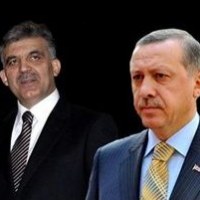![]()
Mon, Feb 11, 2013 | RubinReports | By Barry Rubin
My life’s work and free books.

Picture of Barry Rubin in the 1980s (from the book cover “The Arab States and the Palestine Conflict”). Professor Rubin is a foremost expert on Middle Eastern affairs.
I’ve just put the full text of 13 books which I’ve written onto the Internet. You can access them all for free with a single click. This project has prompted me to think a lot about what I’ve been trying to do these last forty years.
The main goal has been trying to explain the Middle East as it actually exists, how its politics work, and how its history can be understood. My basic overview is contained in my The Tragedy of the Middle East. In structural terms, the Middle East can be seen as paralleling the history and politics of other regions in the world. But along with that is the all-important factor of its specific development.
Europe’s and North America’s countries and peoples have figured out two critical questions: How do we define ourselves? And How do we advance? In the Middle East, instability and turmoil can be traced to the failure to answer these questions. Regarding the first question, religious, regional, ethnic, and national identities still compete on a roughly equal basis. The “Arab Spring” wasn’t about democracy ultimately but about the religious (and in some cases ethnic) identity overcoming the failed nationalist identity of Arabism.
On the second question, the Middle East formulation has been: Why are we behind the West (or even rest of the world) and what do we do about it? By defining the problem as one of imperialism and exploitation, then defining the solution as revolutionary battle, the Muslim-majority Middle East has landed itself in a mess. Relative backwardness has become a self-fulfilling prophesy, with Islamism now replacing Arab nationalism as the doctrine of destruction.
The answer, of course, is pragmatism, reasonably regulated capitalism, and the kind of development that comes from accepting modern innovations, though not necessarily all of them. In short, the Middle East has been heading and continues to head in the wrong direction, with Iran and Turkey dragged into this mix.
How these states have been structured is the topic of Modern Dictators: Third World Coupmakers, Strongmen, and Populist Tyrants. It’s a cross-national comparison of dictators around the world to explain their similarities and differences.
The key theme is the difference between traditional dictators — who just wanted their subjects to obey while they raked in the money — and modern dictators, who seek to mobilize their populations through ideology, control of echoing institutions (education, media, religion), zero tolerance for dissent, and the demand for positive allegiance.
Modern dictators are far stronger and more difficult to overthrown. And when they are overthrown, as current Middle East developments show, they are more likely to be overthrown by other modern dictators than by democracies.
When the book came out (in the 1980s no less!) the Washington Post review dismissed the book by saying that the cause of Third World problems must be sought not in local conditions but because of U.S. imperialism. And that kind of thinking reflects accurately the fact that the American debate on these issues has been heading and continues to head in the wrong direction as well.
It’s not that U.S. policy hasn’t made mistakes but the interpretation of those errors, and of events, has often been misleading. An example is given in my history of U.S.-Iran relations up to the revolution, Paved with Good Intentions. The United States did not lack good intentions when dealing with Iran. And like it or not the disaster came not because U.S. policy was too mean (backing an evil dictator whose secret police used torture) but in undermining (often unintentionally) a bad system so that it could be replaced by a worse one.
This book includes a detailed day-by-day assessment of President Jimmy Carter’s handling of the 1978-1981 Iran revolutionary and later hostage crisis. Briefly, the catastrophe was due to disorganization, wishful thinking, and a naïve view that moderation would inevitably triumph that resembles nothing more than it does the Obama Administration strategy of today. You can read it as a cautionary tale for those who disregard all such warnings.
A case study of both the nature of these dictatorships and of U.S. policy is presented in The Truth About Syria. The paradox of the book’s theme is the contradiction between a regime that is very difficult to overthrow and impossible to reform, and yet the terrible problems and powerful forces that such a regime builds up. The book explains why Syria is such an archetypal case of Middle Eastern politics and why the country is engulfed today in a bloody civil war.
The U.S. policy angle is also important. Briefly, the United States did not recognize that the weaker and more intimidated the Syrian regime became, the more it feared to cross U.S. interests. Squandering this leverage and believing that the correct policy was to win this ferocious dictatorship over by kindness, U.S. policy made the situation far worse.
That picture of the interaction between U.S. policy and the primary — but not exclusive — importance of internal developments is carried over to the Persian Gulf in Cauldron of Turmoil. It’s truly remarkable that this area went from the most apparently distant and esoteric of regions for U.S. foreign policy to the very centerpiece, involving the United States directly in no less than six wars, as well as generating the Iran hostage crisis and September 11! This book explains why and how that happened.
What about present-date alternatives? Islamic Fundamentalists in Egyptian Politics is a history of the Muslim Brotherhood and Salafist movements in Egypt. It focuses mainly on their earlier failures to take over the country but does incorporate the factors that produced their current success in doing so.
The other side of the coin is provided in detail in The Long War for Freedom — The Arab Struggle for Democracy in the Middle East. This, to my knowledge, is the only comprehensive look at America moderate, reformist, and democratic movements and the problems they face in taking over or competing with the Islamists. Briefly, the obstacles to their success is tremendous.
What’s been frustrating about doing this work is that the mainstream debate in the West has gone in a very different direction. Yet if anyone in positions of authority or opinion-making power had understood The Long War for Freedom they never would have had the slightest illusion that the moderates were going to win. The book was written before the “Arab Spring” but it explains and predicts precisely what happened.
The Arab States and the Palestine Conflict asks the question: How did different Arab states become involved in the Arab-Israeli conflict, how did their involvements differ, and was the history that happened inevitable?
Briefly, the book shows the major and consistent differences between countries based on their political cultures and geostrategic situations. It explains that the long conflict, the waste of so many resources, the hegemony of dictatorships and radical thinking were not inevitable but arose from the victory of hard-line forces that fanatically believed that battle was superior to compromise. There were moderate forces which were defeated and the irony is that Israel’s coming into existence was largely due to the Arab radicals getting into control over setting policy.
My trilogy on Palestinians, which has a parallel theme — Revolution Until Victory; The Transformation of Palestinian Politics; and Yasir Arafat: A Political Biography — is not online but you can read the books.
How little things have changed! And that’s the reason why these book are especially important at a time when attention to the Middle East and debates over U.S. policy toward the region are at an all-time high.
Finally, there is Istanbul Intrigues, a book about Turkey, the Middle East, and the Balkans during World War Two. Much of the book concerns espionage, based on never-before-used archives. I’d call it more of a fun read.
Trying to understand the Middle East and U.S. policy for the last forty years has been intellectual challenging and rewarding. On the other hand, watching the same mistakes being made and the refusal to learn the lessons so openly available has been very sad. The tragedy of the Middle East goes on unabated and in some ways it has become the tragedy of the world generally.
Barry Rubin is director of the Global Research in International Affairs (GLORIA) Center and editor of the Middle East Review of International Affairs (MERIA) Journal. His latest book, “Israel: An Introduction“, has just been published by Yale University Press. Other recent books include “The Israel-Arab Reader” (seventh edition), “The Long War for Freedom: The Arab Struggle for Democracy in the Middle East” (Wiley), and “The Truth About Syria” (Palgrave-Macmillan). The website of the GLORIA Center and of his blog, Rubin Reports. His original articles are published at PJMedia.



 RSS
RSS










[…] part one of this article I wrote about books on the Middle East I’ve made available that can be read in full for free on line […]